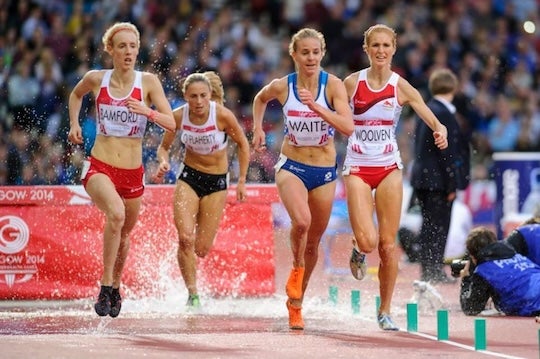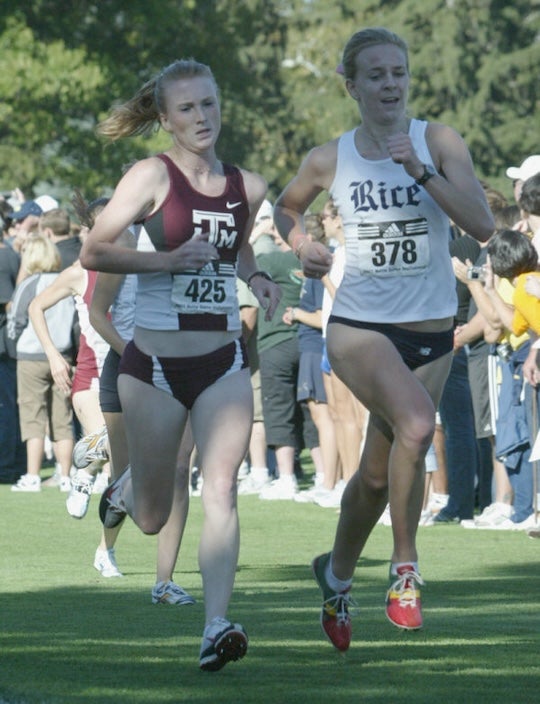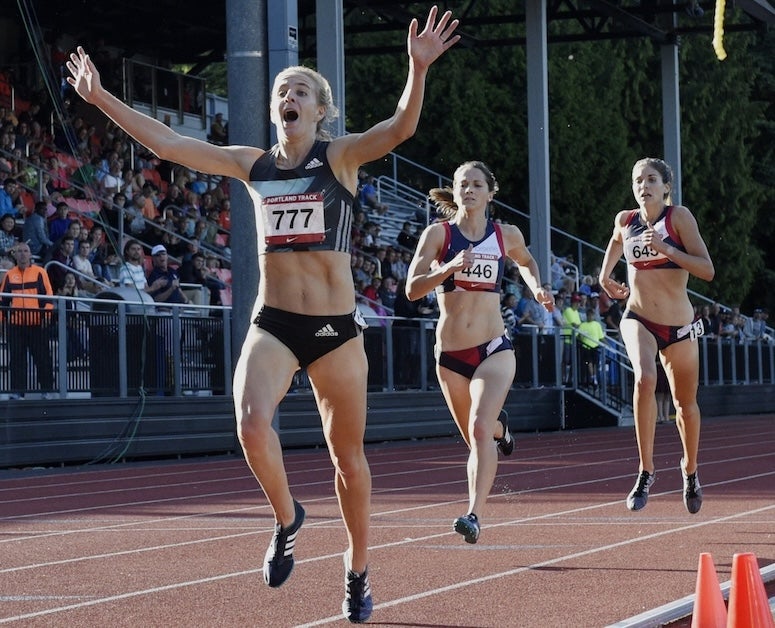Full coverage of Rice at the 2024 Olympics

In the midst of the 2024 Paris Olympics, many former Olympic athletes watch the Summer Games with the perspective of experience, knowing not only what it takes to become an Olympian but also the ups and downs that come with it.
Not many know this better than former Rice University track and field star and 2016 Olympian Lennie Waite.
A standout athlete in her time as an Owl, Waite notched an illustrious career in track and field at Rice before eventually representing Great Britain in the 2016 Summer Olympics.
She was named the Conference USA Indoor Female Track Athlete of the Year in 2009 after capping a magical final indoor season by earning All-America honors. She finished sixth in the mile at the NCAA Indoor Championships with a school-record time of 4 minutes, 38.60 seconds and qualified for the 3,000 meters, finishing 15th.
After her career at Rice, Waite '08 continued to train under Rice head women’s track and field coach Jim Bevan as a professional steeplechaser. She competed professionally for nine years in the 3,000 steeplechase for Great Britain and Scotland. She represented Great Britain in the 2014 European Championships, 2016 Olympics, 2017 World Championships and multiple European Team Championship events.
During her athletic career, Waite faced it all: struggle, triumph, devastating injury and incredible feats. She now uses these experiences to help others in her career as a sports psychologist and part-time lecturer at Rice.
In an interview with Rice News, Waite details her story leading up to becoming an Olympian as well as the highs and lows of competing on the world stage and struggling through adversity while simultaneously achieving a lifetime dream:
Tell me a little about yourself and what led you to Rice.
“I was born in Scotland. My parents are English, which is why I competed internationally for Great Britain. My dad was in the semiconductor industry and that moved us around. So I went to St. Stephen’s Episcopal School in Austin, Texas, and I played a lot of soccer, ran a lot of track. I also have an older sister (Katie Gwyn) who ran at Rice, so I knew about Rice from her. I actually remember touring the campus with her before and laying in a hammock outside of Brown College thinking ‘I could go here one day,’ not even understanding how good of an academic school it was or what it would take to get in.

“In high school, I was a solid academic student, and I wanted to use my sports to get me into an academic school. Jim Bevan, the cross-country and track coach, was interested in having me run and recruited me, but I was also recruited to play soccer. I chose to play soccer over running cross-country and played my freshman year in the fall. At the end of our spring season my freshman year, Jim asked me to come do a race at Stephen F. Austin. He knew I had potential, and he wanted to put me in a low-pressure, fun environment to make me realize I was going to be a great runner. I had a super fun time running that 800. I was always talented, but I didn’t love running yet, and that was the first time I realized that I loved running. So after my sophomore (soccer) season, I ran indoor track and then transitioned fully to track my junior year at Rice. It took about a year for me to get some training under my belt and understand what it took to be great. But my senior year and my fifth year were pretty solid.”
How do you feel like Rice prepared you for the Olympics?
“Rice was the whole reason that I even became an Olympian. The confidence that I built there as a student and an athlete — being able to compete at the Division I level around a ton of other amazing young women and still have confidence in my abilities to succeed and perform, I think it was a place where it made me build that in myself to be successful. It forced me down that path, and Jim Bevan did an incredible job of reinforcing that too. He’s the reason I believed in myself and became an Olympian. When he first talked about the potential for me to go to the Olympics, I think I laughed or brushed it off. But he continued to tell me that I had the skills and tools. And the thing that has helped me the most was that I had a very good degree. So my livelihood didn’t actually depend on running, which in some ways allows you to line up on a start line and take big risks, because even if I failed I had another identity in my Ph.D. studies to fall back on.”
What was your experience in the Olympics like, and what do you remember most from it?
“It’s honestly a lot of really hard memories. As an athlete, I think negative experiences resonate massively. I remember my awesome races and then my really challenging times. The Olympics was like the collision of a dream and a nightmare, because I finally made the Olympic team, which was something I’ve been training really hard for after just missing out in 2012, and I had a pretty bad injury. I ended up rupturing my plantar fascia in the Olympic Games. The feeling of being at this competition that you wanted to be at your peak for so badly — and physically, my lungs, everything else was there — I just could not propel off my foot. The final 10 days before the Olympics, I didn’t run over ground, and I crossed my fingers and prayed that I’d be able to put on my spikes. It was just like, ‘I can’t believe that was my story.’

“When I was there, every day was just trying to make it to tomorrow. I knew after I made the team I’d injured my foot. Then my goal was: make sure I get on the plane to Rio, and don’t let them tell you that you can’t go because you’re injured. So once I got to Rio, they ended up figuring out that I was injured, and I had to go to a Brazilian hospital in the town that we were training in.
“I just leaned on the support staff who told me there would be a way to run. Some people were like, ‘You don’t want to put yourself through it. The risk of a rupture, it’s too much. Just be happy with your season.’ And I’m thinking, I have a Ph.D. … I want to start my career. This is my last shot. So I just focused every day on what I could do. And that’s where some of those sports psychology resources come in. I was fortunate enough to have the perspective and understanding that elite sports isn’t rainbows and butterflies.”
How do you feel like those tough experiences molded you?
“I mean, massively. Because you train and get to the fittest you can be and give yourself a chance to make an Olympic final and then your body just sort of says no. I work with athletes who tell me these stories about themselves and assume it’s never happened to anybody I’ve worked with before, and I’m thinking, ‘One, it has, and also it’s happened to me personally.’ I always joke that my sporting journey was to expose me to all of the things that an athlete can go through, so that when I’m working with them in a professional context, I can help them. I just missed the Olympic team. I’ve been a walk-on turned to an All-American. I’ve dropped out of races, I’ve won races. If it can happen in the world of track, I probably went through it.”
What was it like being in Rio de Janeiro and soaking in the moment during the Games?
“Just being exposed to what it’s like — you can watch it on TV, but to actually pull up in a bus at the Olympic Village and walk through the security gates, go into one of the apartments, use the food hall. I remember sitting there like, ‘I am like a very average human in terms of my athletic performance surrounded by all of these incredible high-performing humans’ and just to put it into context of how unique it is to be in that space. Also the relationships that you develop when you go through an Olympic cycle with somebody — some of my best friends are still people who I went through that journey of making an Olympic team with, so the relationships are huge.

“Then just the little things. I remember eating in the dining hall with one of my friends, and the U.S. women’s gymnastics team sat down next to us. And we were listening to the young women on that team talk, and it really resonated with me at the time like, ‘Wow, they’re like 15, 16 years old.’ They’re talking about flavors of gum and their favorite cereals, and we had just watched them do this incredible performance on TV where they were so professional. So just the human element behind all of these great people was something that I have continued to take with me into my career. These people do have insane talents, but when you sit next to them and just listen to their conversations while they’re eating, they couldn’t be more normal.”
What was it like for you to not only represent Scotland but also be able to represent Rice during the Olympics?
“Rice holds a huge amount of responsibility for forming me into the athlete that I was. And without that, I wouldn’t have made it to the Olympics. Jim Bevan’s philosophy is so incredible, and Rice is a school where we don’t have 40 people joining the cross-country team. It’s not like a lot of programs where you have 40 women show up and the top rise to the top. They invest so much in developing talent. And if I would have gone to a different school, maybe a coach wouldn’t have found something special in me or maybe I just would have been washed away in the numbers game. So being able to have the opportunity to develop there was so unique.”
How much does it mean to you to be able to say that you're an Olympian?
“It means the world to me. Even though my Olympic experience wasn’t cookie cutter, I’m so glad to be able to say I was an Olympian. Track and field is a hard sport to explain to people. If you told someone, ‘Oh, I ran nine years professionally,’ then they’d be like, ‘What does that mean?’ It doesn't land right. But when you say, ‘I competed in the Olympics,’ it’s like ‘Oh, okay. That’s legit. That makes sense.’ So to me, it takes away all of those asterisks next to being a professional athlete. Being an Olympian is a worldwide language of understanding what it’s like to be in a high-performance environment.”
How does your passion for track and field carry over in your life today, and what steered you toward a career in sports psychology?
“So I still run six days a week. If I have meetings canceled in the afternoon and I have the chance to go to the track to do a workout at Rice, I take that opportunity any day of the week. People wake up, they brush their teeth, have their breakfast, and for me, running is within that. It’s sort of like breathing for me. For a huge part of my career, it was a job and very performance focused. It’s now a place to think and reflect.

“There’s a Rice professor named Mikki Hebl. She introduced me to the field of industrial organizational psychology. She is great, and she helped me navigate that process. When I first started doing industrial organizational psychology, I wasn’t necessarily interested in working with athlete populations. I was more interested in workplace motivation, effective work teams and cultural issues in the workplace. I think as I was starting to get into the more elite world of sports, I realized it functions like a business. And I realized there’s actually a ton that I could bring to this field with my personal experiences and my degree knowledge.”
What made you want to return to Rice after your competitive career?
“The community, of course, I love. But more than anything, it’s the program that Jim Bevan has built at Rice. You look at the turnover that most programs have with their coaches or how their philosophy changes through the years. Rice has had Victor Lopez, who Jim was the assistant under, and then when Victor left, Jim took over. So the program is built on such a solid foundation with such an understanding of what it looks like to be highly aspirational academically and athletically. When I tell people that I got my Ph.D. and ran professionally they look at me like, ‘Who would ever tell you that you can do both of those things?’ Yeah. And it’s Jim. Because when you’ve coached at Rice for long enough, you see people push the limits and do really crazy things. And I felt like it was a place where I could walk up and say, ‘I want to play soccer. I want to run track. I want to double-major. I want to be a doctor one day, and I want to run in the Olympics,’ and they’d be like okay, and I think there are a lot of places that would tell you, no, you can’t do that. And Rice never did that to me.”

